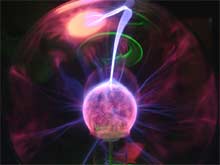A Washington, D.C.-based company is in the preliminary stages of developing a $250 million plant in California to make jet fuel out of garbage, manure and tree bark. Solena Group hopes to build the plant in Gilroy, Calif., and will use raw material from municipal, agricultural and forestry waste supplied by Norcal Waste Systems, one of California’s largest municipal waste and biomass collectors.
Solena's process uses 6-8 plasma torches at 5000 degrees C in a large reactor that they call the "gasification island". The company also says it can then use the syngas to power a combined-cycle gas turbine to produce electricity or feed it into a Fischer Tropsch reactor to produce aviation-grade liquid diesel fuel. Solena claims that this process converts biomass to gas at up to 90% efficiency.
Solena's Bio-Fuel System (BFS) sequesters all the resulting carbon dioxide and nitrogen oxide emissions from turbine combustion. Then, rather than try to find a place to stuff it in the ground, the unwanted pollutants are used to feed phyto-plankton, which grows up and later gets zapped as biomass. This, in essence, creates a closed system.
Because plasma gasifiers simply blast things to smithereens, they have a unique advantage over other biomass facilities. They can take just about any biomass fuel you can throw at it including municipal solid waste (MSW), agricultural leftovers, and more. Velez says, "We can take 3 or 4 feedstocks at the same time and put them into our gasifier."
She says that this diversity is a strength for Solena because the plant can adjust to the available biomass in a given location rather than compete for or with existing food crops.
Velez says that the company will likely sell electricity to the grid at 8 to 12 cents per kilowatt, possibly competitive with the 2006 U.S. average of 8.9 cents per kWh. This is especially true as states ratchet up commitments to cleaner energy. She says, "The market is driven for that. Consumers will be demanding it as well."
The company currently has four projects in the permitting stage, including a 20-28 MW plant in the Czech Republic and a 15 MW plant in Spain. Among Solena's other initiatives are to build five 40 megawatt plants in California and a partnership - announced on March 5th - with a coal-to-liquids company to build a facility that will produce 17 million gallons of bio-jet fuel per year, also in CA.
Velez thinks her company is well positioned for the low carbon push. "We want to grow in the sector of carbon sequestration and net zero emissions because we can do that now. The market is going to go towards that. And we're going to go with it," she says.

